
Sid Meier’s Pirates!
Written by: Rik
Date posted: June 8, 2014
- Genre: Action
- Developed by: Firaxis
- Published by: 2K Games
- Year released: 2004
- Our score: 8
In what some may consider the latest act of retro-heresy perpetrated by this site, we’re going to cover the remake of Pirates! without making much reference to the earlier versions (the original Sid Meier’s Pirates!, first released in 1987, and Pirates! Gold) because, well, your reviewer has never played them. Frankly, they never much appealed to me at the time, with my brain initially choosing to categorise them alongside Sid Meier’s fustier strategy titles such as Civilization and Railroad Tycoon. It wasn’t until I played, and enjoyed, Covert Action that I considered that I might be able to enjoy some of his less-complicated offerings, by which point the visually plush and critically robust modern remake of Pirates! had already been on the market for long enough for it to have secured a budget release. Yes, I admit it, I thought the older ones looked boring, and the superior visuals and sunny presentation of this modern remake were enough to sway me. Sorry.
Anyway, Pirates! is an open-ended game, as we shall see, although there is an intro sequence which outlines some story elements, including the tale of how your character actually came to be a pirate in the first place. A family dinner celebrating the likely resolution of a long-standing debt to Marquis Montalbán is interrupted by the Marquis himself, who announces that the fleet bringing the money needed to pay him has been lost, and so he will instead be seizing your family’s property and selling your relatives into bondage. A mere child at the time, you manage to escape, and later, as a young man vowing revenge, become part of a pirate crew. After leading a mutiny against the captain, you now have command of your very own ship.
At which point, the game proper begins, with you at the helm of a small sloop, a band of loyal men behind you, and the whole Caribbean to explore. You’ll want to undertake a number of piratey tasks including attacking other ships with cannons, boarding and capturing them, romancing local ladies, searching for buried treasure (arh-hah!) and ransacking towns. Oh, and at the same time, you may choose to pursue your own private agenda of searching for your lost relatives and the evil Marquis who captured them.
It’s probably worth mentioning that Pirates! presents an extremely cuddly and sanitised version of the period and life on the seas, even compared to something like Monkey Island. There’s no slaughter, no drinking and no politics, everyone has nice teeth and the aforementioned romantic congress comes in the form of dancing with the local aristocracy. Those seeking a gritty and harrowing historical account of the period won’t find it here, although handily there is a glossary of seafaring terms included that you can use for reference, if you’re so inclined.
Pirates! is essentially composed of a selection of mini-games, all of which are easy enough to understand and manipulate, if not to master. Control is generally via the numerical keypad, even the main task of navigation, which is also pretty straightforward. Having consulted the map, you establish a suitable destination, and point your ship in the appropriate direction using the ‘4’ and ‘6’ keys, taking note of the wind speed and direction, which may help or hinder you. Should you come across another ship along the way, you can simply pull alongside it and hit ‘5’ to enter into a battle.
Combat is along the same lines, but with a zoomed in view, and a much slower pace. It’s a bit of a game of cat and mouse, what with ships not being the most manoeuvrable of things, and cannons taking some time to reload, so it’s important to ensure your shots are lined up to do maximum damage, while also making sure your own ship isn’t left exposed to enemy fire. You can also board the other ship by moving towards it and making contact, at which point you’ll enter into a fencing duel.
Swordplay is a case of hacking at the keypad at the appropriate moment to force your opponent back (and, ultimately, into the sea) while also blocking/avoiding any blows that come your way. All the while, your respective crews are battling each other, and should one side be victorious while your own fight is still ongoing, then that’s another way for victory (or defeat) to be sealed. Fencing is also used in other contexts, such as in bar fights, or when battling the jealous fiancé of one of the many women you may have romanced during your adventures.
And speaking of which, as we mentioned, impressing the governor’s daughter is the subject of another sub-game. The young lady leads by indicating with a hand gesture the direction of the next move, and you need to press the appropriate key to perform the move. Get it right, and she’ll be impressed, but get it wrong and you’ll trip over your feet and she’ll make a noise of vague disappointment. At the end, it’ll be clear how she feels you’ve done overall.
Other mini-games, which tend to be used less frequently, include exploring on land to search for buried treasure or lost relatives (using a map and landmarks to navigate); ransacking a town via a simple turn-based strategy sequence pitting your crew against the local town militia; or sneaking into (or out of) a town and avoiding the town guard in a stealth caper reminiscent of (but nowhere near as good as) Metal Gear Solid.
These are simple elements, then, but they’ve been skilfully woven together with some other subtleties to make a rather satisfying whole. For a start, the various colonising nations are usually at war with another and, having declared an initial allegiance to one of them (the English, French, Dutch or Spanish) your actions have consequences in this regard. If the English are at war with Spain, then sinking Spanish vessels is likely to improve your standing with them, and this is likely to be reflected when you next visit an English port and see the governor, who can reward you with a promotion. Promotions have various advantages in that nation’s ports, as well as counting towards your overall career achievements. On the other hand, irritate another nation (say, in this example, the Spanish) and you’ll ultimately be unable to enter their ports without sneaking in, and they may also put a bounty on your head that means you’ll attract the attention of some pirate hunters on your travels.
While you’re docked, aside from the governor’s mansion, you can also visit the local tavern, where you can recruit additional crew, among other things. Having a large crew helps you maintain a larger fleet, aids faster cannon reloading during battle, and also gives you an advantage when boarding ships (in case you don’t quite manage to finish off the opposing captain during a swordfight). On the negative side, it means more mouths to feed, and more people to share your treasure with (arh-hah-hah! me hearty etc).
In each tavern there will also be a ‘mysterious stranger’ who will offer to sell you a piece of a treasure map, a valuable item (such as a ruby ring which is necessary to further your romantic liaisons) or just give you some information about another port. Completing the list of tavern regulars are the barkeep and barmaid, who will share information for free, including details of the whereabouts of someone called Baron Raymondo, who seems to have a monopoly on information about your missing family members, but for some reason, when you find his ship and defeat him in battle, only gives up a single map piece before you have to do the whole thing all over again.
You’ll find the same selection of people in every tavern, but wisely Firaxis decided against speech for the characters, otherwise the repetitive nature of these conversations would soon grate. Instead, good old-fashioned text is used, complemented by some vaguely Sim-sounding fake language, which occasionally raises a smirk (and which, during temporary periods of madness caused by a particularly long session, you may also find yourself mimicking out loud).
Elsewhere in port, you can visit the merchant and stock up on food and buy or sell other goods. Prices vary from place to place, and there are occasional notes here and there that hint at trying to buy low and sell high, although I seriously doubt that trading goods is a viable full-time option here. Personally, I found myself just paying whatever the going rate was for food, and selling whatever I’d nicked from the last captured ship, regardless of price, in order to free up space in the hold.
Each town has a shipwright, who can repair any damage (for a fee, unless your rank determines otherwise) and provide one of a number of upgrades for your ship, including better sails, armour plating, and alternative shot for your cannons, including grape (for targeting crew) and chain (for damaging sails). This actually adds a further tactical dimension to tougher battles. You can also sell any ships you may have captured here, although if such ships are carrying cargo you’ll need to make sure it is sold first or else it will be dumped. If you’ve captured a better ship than the one you had previously, you can if course make that your flagship and get rid of your old one (renaming the captured ship to something suitably ridiculous if you so please).
Still on the port options, and there is the opportunity to check your status (although this can be accessed while at sea as well) – bringing up a map, logs of your travels and conversation, details of treasure map pieces collected, and any other ongoing quests, as well as a summary of your overall career achievements and your standing among the region’s top pirates. As well as making a name for yourself via general piratey deeds, you can also improve your fearsome reputation by taking on Blackbeard et al in battle, stealing their considerable earnings and putting them out of the pirate game forever.
While docked, you may decide to divide your plunder with your crew and take a rest from the pirate game for a few months. The morale of your crew will be the main factor to take into consideration here. You can keep ye shipmates (apologies) happy by living the exciting pirate life, boarding ships and ransacking towns, and finding buried treasure. On the other hand, things like long, uneventful journeys and running out of food tend to do the opposite. Ultimately, you can’t keep them onside forever, and so you need to split your earnings and go your separate ways at various points throughout the game.
The lifespan of your own career is also finite. You begin as a mere teenager in excellent health, but as time passes in game your age increases and your health starts to fail (alarmingly, or not – depending on your real age – starting to hit crisis point in your mid-30s). Your avatar starts to look a bit more wrinkly, and fencing becomes tougher due to your slow mind and ageing body (I know the feeling well). You can plug on until the game forces you to retire, or take the decision yourself if you’ve achieved all you want. Either way, that will be the end of the game, at which point your military, romantic, financial and other achievements are used to determine a post-pirate career, which may be anything from a barkeep to a town governor.
Pirates! is a lot of fun, particularly when you have a number of tasks on the go and you’re plotting how best to accomplish them. Much like another open-ended favourite, Midwinter, a lot of the enjoyment comes from setting your own goals, and there’s a definite feeling that you just need to do one more thing – be it make it to the next port, find some treasure, or whatever – and before you know it, several hours have passed.
As with Covert Action, the sub-games are simple but effective, but unlike Covert Action – which relied too heavily on the ‘breaking and entering’ top-down action bits – there’s a good balance between them. You’ll see some more than others, certainly, but you’ll need to use them all at some point. Despite their simplicity, some can be quite challenging, even on lower difficulty levels (much like in real life, my dancing didn’t really impress too many women).
Even so, you can breeze through a career fairly easily, and for me at least there was no sense of linking my enjoyment to my overall career achievements, and it’s the journey itself that’s fun – which makes sense when you think about it, as the life of a pirate is surely supposed to be more about finding treasure and having tales of the high seas to share in later life than an exercise in studied careerism.
It helps that Pirates! is aesthetically pleasing, with bright, jolly graphics and catchy music, and the interface is simple and easy to use, allowing you to save at any point while at sea, and compensating for any potentially rash decisions on your part by automatically saving at the point of your last battle or the last time you were docked. I also liked the way you can adjust the difficulty upwards each time you divide the plunder so as to maintain the level of challenge without having to restart. There’s also a tangible reward for doing so, in the form of a higher percentage of the shared riches.
Repeat plays are a must, even without necessarily being driven by a desire for significant improvement in your own performance. However, you’d have to say that it does eventually get a bit repetitive, and I’m not convinced that adjusting your starting speciality (which are each designed to make a particular part of the game, such as fencing – a fairly obvious one to go for initially – easier), allegiance, or difficulty level provides sufficient variety of reward. Also, while the mini-games are fun, I never really mastered them, or got the sense that I could ever (or even want to) do so. Even on moderate difficulty, I got my ass kicked fairly swiftly by Marquis Montalbán.
Admittedly, I was usually in the twilight years of my career at the time, which aren’t necessarily as fun as the more carefree beginnings, if only because by that point you tend to be focused on one or two specific goals, most likely the family related quests, which can be a bit of a slog at times (especially having to track down bloody Baron Raymondo time after time}. Another bugbear is the fact that the wind only ever seems to blow in a westerly direction, making journeys east painfully slow, and causing you to become as restless and mutinous as your in-game crew.
The only other criticism I could mention is the fact that the game was subsequently released on PSP, which is actually – further declaration of retro crimes forthcoming – the first version I played. I’d say that it’s probably even more enjoyable as a mobile game (although I can’t comment on iOS versions) – where the simplicity and occasionally repetitive nature of the gameplay is more easily overlooked, and the interface has been tweaked still further to make certain areas (such as the dancing) a little easier to follow.
Still, its not like this is an inferior version in any significant respect, other than it just so happens, almost by accident, to be naturally well-suited to a mobile platform. As I mentioned, I can’t compare this to the earlier releases, although my understanding is that the core of the game remains largely the same, and if this is the case, then this remake is certainly a testament to the enduring qualities of the original. On the other hand, playing this one in isolation does mean I can judge it on its own merits. And my judgement tells me that Pirates! is a breezy, enjoyable title that compels you to keep playing even when you know you should stop, and as such, it comes highly recommended.

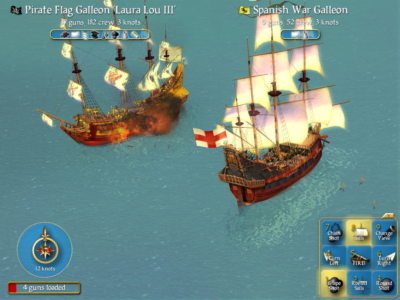
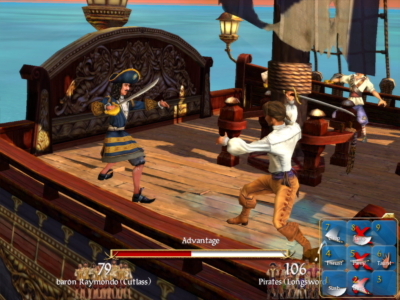
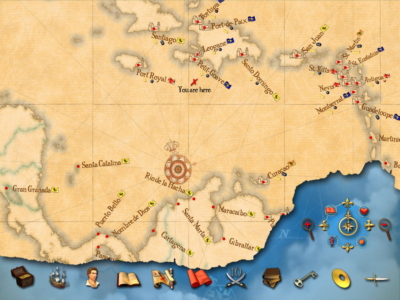
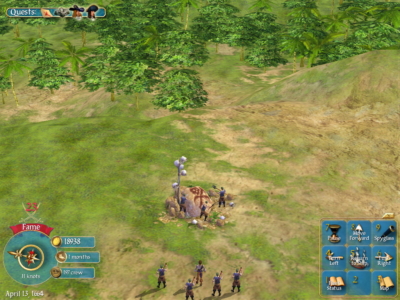
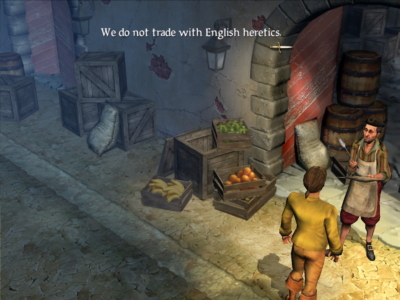
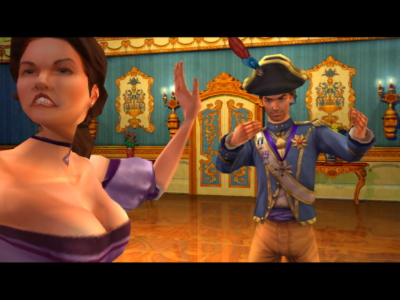
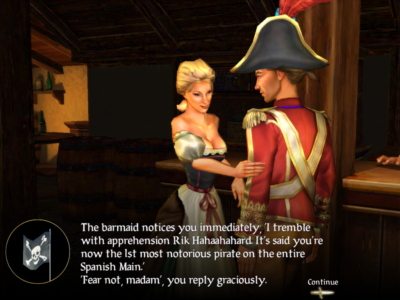

 Posts
Posts
I found this game in a Wal-Mart bargain bin of all places, and definitely got my $4.99 worth out of it…I think my crowning achievement was aggravating the Dutch to the point they sent out a Ship of the Line, hijacking said ship, and then using it to become the biggest douche in the Caribbean. Like, not so much raiding towns and stealing money as much as the muscle-flexing joy of using a ship with 48 guns and 450 crew to sink Indian war canoes, pinnaces, and ships carrying immigrants and governors just for the hell of it. YOU WILL KNOW FEAR, AND ITS NAME IS “LORD BALTIMORE”!
June 8, 2014 @ 6:44 pm
In that screencap, I sincerely hope Baron Raymondo was shouting about how you fight like a dairy farmer.
June 9, 2014 @ 9:02 am
I think if ever there was an excuse for going around being a dick without much thought for the consequences, then being a pirate is a pretty good one.
The fencing actually is slightly reminiscent of Monkey Island, in that it’s a win-step-forward, lose-step-back type affair. There is a ‘taunt’ option but sadly it involves no clever wordplay.
June 9, 2014 @ 12:39 pm